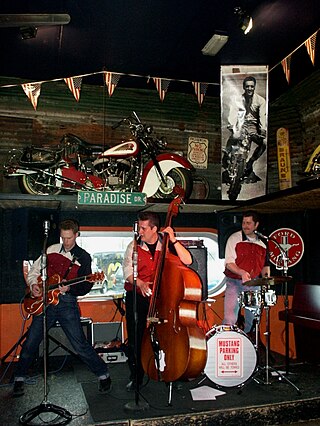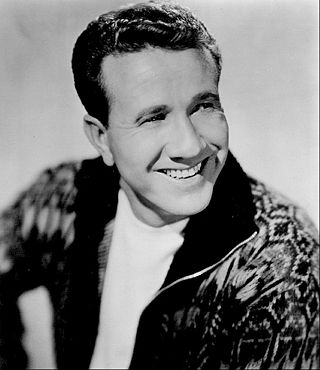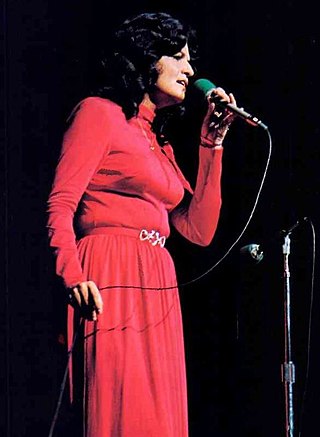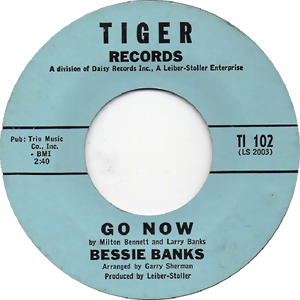
Rockabilly is one of the earliest styles of rock and roll music. It dates back to the early 1950s in the United States, especially the South. As a genre it blends the sound of Western musical styles such as country with that of rhythm and blues, leading to what is considered "classic" rock and roll. Some have also described it as a blend of bluegrass with rock and roll. The term "rockabilly" itself is a portmanteau of "rock" and "hillbilly", the latter a reference to the country music that contributed strongly to the style. Other important influences on rockabilly include western swing, boogie-woogie, jump blues, and electric blues.

Martin David Robinson, known professionally as Marty Robbins, was an American singer, songwriter, multi-instrumentalist, and NASCAR racing driver. Robbins was one of the most popular and successful country and western singers for most of his nearly four-decade career, which spanned from the late 1940s to the early 1980s. He was also an early outlaw country pioneer.

Guy Mitchell was an American pop singer and actor, successful in his homeland, the UK, and Australia. He sold 44 million records, including six million-selling singles. His best-known songs include "My Heart Cries for You", "Heartaches by the Number" and "Singing the Blues".

Ann Lee Peebles is an American retired singer and songwriter who gained popularity for her Memphis soul albums of the 1970s while signed to Hi Records. Her most successful singles include "I Can't Stand the Rain", which she wrote with her husband Don Bryant and radio broadcaster Bernie Miller, and "I'm Gonna Tear Your Playhouse Down". In 2014, she was inducted into the Memphis Music Hall of Fame.
"Heartaches by the Number" is a popular country song written by Harlan Howard, and published in 1959. The sheet music was a best seller in both the US and Britain in January 1960.

"I Put a Spell on You" is a 1956 song written and recorded by "Screamin' Jay" Hawkins. The selection became a classic cult song, covered by a variety of artists. It was Hawkins' greatest commercial success, reportedly surpassing a million copies in sales, even though it failed to make the Billboard pop or R&B charts.

Jeanne Pruett is an American country music singer and songwriter. She also has credits as a published author. Pruett had several major hits as a music artist, but became best-known for 1973's "Satin Sheets". The song topped the country music charts and helped her secure a membership in the Grand Ole Opry cast.
"Young Love" is a popular song, written by Ric Cartey and Carole Joyner, and published in 1956. The original version was recorded by Ric Cartey with the Jiva-Tones on November 24, 1956. Joyner was a high school student when she co-wrote the song with Cartey, her boyfriend at the time. It was released in 1956 by Stars Records as catalog number 539 and one month later by RCA Records as catalog number 47-6751. Cartey's version never charted.

"Go Now" is a song composed by Larry Banks and Milton Bennett and first recorded by Bessie Banks, released as a single in January 1964. The best-known version was recorded by the Moody Blues and released the same year.
"The Story of My Life" is a song written by Burt Bacharach and Hal David. It was published in 1957. It was recorded by Marty Robbins and reached number one on Billboard's country chart in 1958, and it became a number one hit song for Michael Holliday in the UK.

"A White Sport Coat (And A Pink Carnation)" is a 1957 country and western song with words and music both written by Marty Robbins. It was recorded at the Bradley Studios in Nashville, Tennessee on January 25, 1957, and released on the Columbia Records label on March 4. The arranger and recording session conductor was Ray Conniff, an in-house conductor/arranger at Columbia. Robbins had demanded to have Conniff oversee the recording after his earlier hit, "Singing the Blues", had been quickly eclipsed on the charts by Guy Mitchell's cover version, which was scored and conducted by Conniff in October 1956.
"I'll Be Home" is a 1955 song that was written by Ferdinand Washington and songwriter, Stan Lewis.

The discography of American country music singer Marty Robbins consists of 52 studio albums, 13 compilation albums, and 100 singles. In his career, Robbins has charted 17 Number One singles on the Billboard Hot Country Songs charts, as well as 82 Top 40 singles.
"You Gave Me a Mountain" is a song written by country singer-songwriter Marty Robbins during the 1960s. It has been recorded by many artists, including Robbins himself, but the highest-charting version of the song was by Frankie Laine in 1969. This version was included on Laine's album of the same name.
"Ribbon of Darkness" is a song written by Gordon Lightfoot that was released in 1965 as a single by Marty Robbins. The song was Robbins' eleventh number one on the U.S. country singles chart, where it spent one week at the top and a total of nineteen weeks on the chart.
Mitty Lene Collier is an American church pastor, gospel singer and former rhythm and blues singer. She had a number of successful records in the 1960s, of which probably the best known is "I Had A Talk With My Man".
Melvin Endsley was a musician, singer, and songwriter best known for writing the song "Singing the Blues", along with over 400 songs recorded by hundreds of artists since 1956. Some of the artists that have recorded his songs include Johnny Cash, Marty Robbins, Andy Williams, Paul McCartney, Stonewall Jackson, and Ricky Skaggs. At the beginning of his career, Endsley recorded including RCA and MGM, however, his vocal recordings were commercially unsuccessful. In 1998, he was inducted into the Arkansas Entertainers Hall of Fame.
"Knee Deep in the Blues" is a song written by Melvin Endsley, and recorded by American country music artist Marty Robbins. It was released on December 17, 1956 as the lead single from his compilation album Marty's Greatest Hits. The song reached #3 on the Country Singles charts.

Tommy Steele Stage Show is a live album by English entertainer Tommy Steele, released as a 10-inch LP by Decca in March 1957. A concert recording of Steele backed by the Steelmen at London's Conway Hall, it was his first album release and features a version of the hit single "Rock with the Caveman" alongside several covers of American songs including three previously recorded by Hank Williams. The album's release followed Steele's swift rise to fame as a teen idol widely considered Britain's first rock and roll star, and the success of his UK Singles Chart number one "Singing the Blues". It received a muted critical reception but was commercially successful, peaking at number five on the UK Albums Chart.










